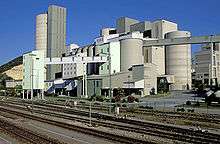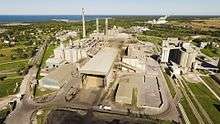HeidelbergCement
HeidelbergCement is a German multinational building materials company headquartered in Heidelberg, Germany. It is a DAX corporation and is one of the largest building materials companies in the world. On 1 July 2016, HeidelbergCement AG completed the acquisition of a 45% shareholding in Italcementi. That acquisition made HeidelbergCement the number one producer of construction aggregates, the number 2 in cement and number 3 in ready mixed concrete worldwide.
| Aktiengesellschaft | |
| Traded as | FWB: HEI |
| ISIN | DE0006047004 |
| Industry | Building materials |
| Founded | 1874 |
| Founder | Johann Philipp Schifferdecker |
| Headquarters | Heidelberg, Germany |
Key people | Dr. Dominik von Achten (CEO and chairman of the managing board)[1] Fritz-Jürgen Heckmann (Chairman of the supervisory board) |
| Products | Cement, aggregates, concrete, asphalt |
| Revenue | €18.851 billion (2019) |
| €2.131 billion (2016) | |
| €1.123 billion (2019)[2] | |
| Total assets | $41,9bn (2018)[3] |
| Total equity | €18,504 (2019) |
Number of employees | 55,047 (31 December 2019) |
| Website | www.heidelbergcement.com |
The enlarged group has activities in around 60 countries with 57,000 employees working at 3,000 production sites. HeidelbergCement operates 139 cement plants with an annual cement capacity of 176 million tonnes, more than 1,500 ready-mixed concrete production sites, and over 600 aggregates quarries.[4]
History

The company was founded on 5 June 1874 by Johann Philipp Schifferdecker, at Heidelberg, Baden-Württemberg, Germany. It was making 80,000 tonnes per annum of Portland cement in 1896. It acquired numerous other small companies from 1914 onwards, and by 1936, it was making one million tonnes per annum.
Following the Nazi seizure of power in 1933, the cement industry profited massively from state-run construction and armaments projects, leading to a generally positive view of the policies of the Reich government among workers and management of the company.[5] The company's general director Otto Heuer had joined the NSDAP on May 1 in 1933 and was a member of the Freundeskreis Reichsführer SS.[6] During the Second World War, the cement industry was classified as essential to the war effort and initially experienced only minor restrictions in production. As the war progressed, prisoners of war and forced labourers were used in numerous plants; according to the company, the number of people affected is estimated at 1,000.[7]
Activities abroad began with the acquisition of part of Vicat Cement, France. Shipments reached 8.3 million tonnes in 1972. In 1977, a massive program of purchases in North America began with the acquisition of Lehigh Cement. In 1990, expansion in eastern Europe began.
In 1993, it acquired part of SA Cimenteries CBR of Belgium, which already had a major multinational operation. Since then it has continued to expand, with complete buy out of CBR, and purchases in eastern Europe and Asia. A major step was the acquisition of Scancem in 1999, with operations in Northern Europe as well as Africa. Indocement in Indonesia was included in 2001.
In May 2007, the British company Hanson was acquired, a transaction worth £7.85 billion (US$15.8 billion), which gave the company a stronger market position in the United Kingdom and the United States, and turned HeidelbergCement into the world's leading producer of aggregates.

HeidelbergCement has (2010) 29 cement and grinding plants in Western and Northern Europe, 19 in Eastern Europe and Central Asia, 16 cement plants in North America, and 14 in Africa and the Mediterranean Basin. The company sold Maxit Group and its 35% share in Vicat Cement to help finance its acquisition of Hanson plc in August 2007. In most of the group’s European countries, HeidelbergCement is the market leader in the cement business.
Adolf Merckle was a big investor in HeidelbergCement.[8] A capital increase in HeidelbergCement in September 2009, combined with a selling of shares from the Merckle family, opened up for other international owners and higher trading volumes on the stock exchanges. In August 2006, HeidelbergCement AG entered the Indian cement market with the acquisition of Mysore Cement.[9]

On 1 July 2016, HeidelbergCement AG completed the acquisition of a 45% shareholding in Italcementi S.p.A. With the acquisition, HeidelbergCement becomes the number 1 producer of aggregates, the number 2 in cement and number 3 in ready mixed concrete worldwide. The company agreed to sell its assets in the United States for $660 million to Cementos Argos to fulfil anti trust requirements for the takeover.[10]
HeidelbergCement has entered new important markets, such as France and Italy in Europe, Egypt and Morocco in North Africa and Thailand in southeast Asia. In the Canada, India and Kazakhstan, the takeover will further strengthen the existing market presence of HeidelbergCement.[4] The enlarged group has activities in around sixty countries, with 60,000 employees working at 3,000 production sites. HeidelbergCement operates 139 cement plants with an annual cement capacity of 176 million tonnes, more than 1,500 ready mixed concrete production sites, and over 600 aggregates quarries.[4]
The company worldwide
HeidelbergCement's Global Corporate Headquarters are located in Heidelberg, Germany.
The company operates in over 50 countries/territories around the world including:
Controversial activities and critique
Indonesia
HeidelbergCement has been heavily involved in the planned construction of a controversial cement plant on the Indonesian island of Java through its subsidiary "Indocement". The objective is the exploitation of the Kendeng mountains against the resistance of the people living there.
In addition to the destruction of the complex ecological system, the construction also has created the marginalization of partially indigenous living inhabitants of the region to follow.[11] In this region, the indigenous known as Sedulur Kendeng are protesting against the planned mining operation of PT Semen Indonesia, a state owned enterprise. In March 2017, 50 protestors poured concrete over their feet in front of the Presidential Palace in Jakarta. This is the second time this has occurred in eleven months.[12]
In addition to the protest against the factory building and its ecological consequences as "misconceived `development` at the expense of indigenous and peasants", the activists also appealed politically at HeidelbergCement that a multinational "company should not invest in environmental destruction and human rights violations, in any country in the world."[13]
West Bank
In Israeli occupied West Bank HeidelbergCement's wholly owned subsidiary Hanson Israel manufactures ready-made cement, aggregates and asphalt for Israel’s construction industry. In March 2009, the Israeli human rights organization Yesh Din filed a petition with the Israeli high court demanding a halt to mining activity in West Bank quarries, including Hanson Israel's Nahal Raba quarry.[14][15]
According to research of the ARD magazine "Panorama" on 2 September 2010 and the ARD Studios Tel Aviv, the minerals produced are brought to Israel without any benefit to the Palestinian communities.[16] Palestinians from the village of az-Zawiya in the immediate vicinity of the quarry lay claim to the land. The Israeli Supreme Court rejected the petition from Yesh Din in December 2011.
In 2015, HeidelbergCement founded a new subsidiary, HeidelbergCement Palestine and started the import of cement to Gaza and West Bank. HeidelbergCement Palestine is now in the process of setting up quarry operations in Palestine.[17] The largest Danish pension fund, PFA Pension(Da), has divested its interest from HeidelbergCement, due to "Violation of basic human rights, which conflicts with UN Global Compact principles 1 and 2."[18]
See also
List of companies traded on the DAX Main HeidelbergCement competitors are:
References
- Beumelburg, Christoph. "Dr. Dominik von Achten becomes the new Chairman of the Managing Board of HeidelbergCement". HeidelbergCement. Retrieved 22 February 2020.
- https://www.heidelbergcement.com/de/system/files_force/assets/document/5c/14/heidelbergcement_annual_report_2019.pdf
- https://www.forbes.com/companies/heidelbergcement/
- "HeidelbergCement schließt Erwerb von 45%-Anteil an Italcementi ab". HeidelbergCement Group (in German). 1 July 2016. Retrieved 2016-07-07.
- Cramer, Dietmar (2013). "Die Geschichte von HeidelbergCement. Der Weg des süddeutschen Unternehmens zum internationalen Konzern" (PDF) (in German). p. 94. Retrieved 2020-04-06.
- "Statistisch-wissenschaftliches Institut des Reichsführers SS: Angehörige des Freundeskreises des Reichsführers-SS" (in German). Retrieved 2020-04-06.
- Cramer, Dietmar (2013). "Die Geschichte von HeidelbergCement. Der Weg des süddeutschen Unternehmens zum internationalen Konzern" (PDF) (in German). p. 101. Retrieved 2020-04-06.
- Adolf Merckle on Forbes.com
- "HeidelbergCement India CEO Ashish Guha quits". Times of India. 2 May 2014.
- "HeidelbergCement sells U.S. assets for $660 million". Reuters. 2016-08-18. Retrieved 2016-08-18.
- Tempo.Co-. "Warga Kendeng Tolak Pabrik Semen di Depan Kantor Kedutaan Jerman | lingkungan | tempo.co" (in German). Retrieved 2016-06-28.
- "Kendeng Against Cement". MR online. 27 March 2017. Retrieved 2 May 2017.
- "News - Berlin: Solidarität mit Kendeng gegen HeidelbergCement - Rettet den Regenwald e.V." www.regenwald.org (in German). Retrieved 2016-06-28.
- Request by Yesh Din to the Supreme Court in Israel. Archived 2016-03-07 at the Wayback Machine (English)
- HeidelbergCement, whoprofits.org
- Deutsches Investment: Raubbau im Palästinensergebiet, ARD-Magazin Panorama, 2. September 2010 (German)
- "HeidelbergCement Palestine". HeidelbergCement Palestine. 2 May 2017. Retrieved 2 May 2017.
- Responsible investment, PFA pensions